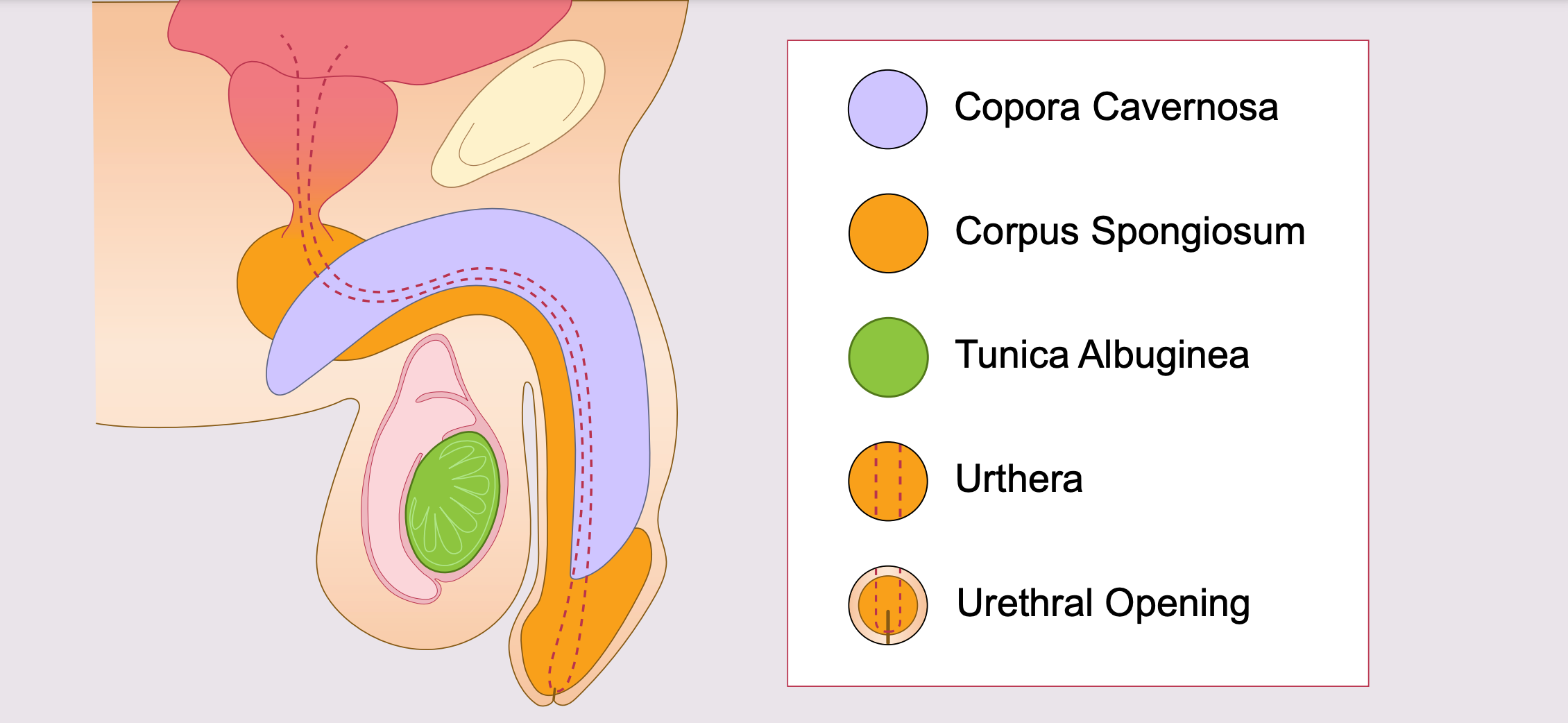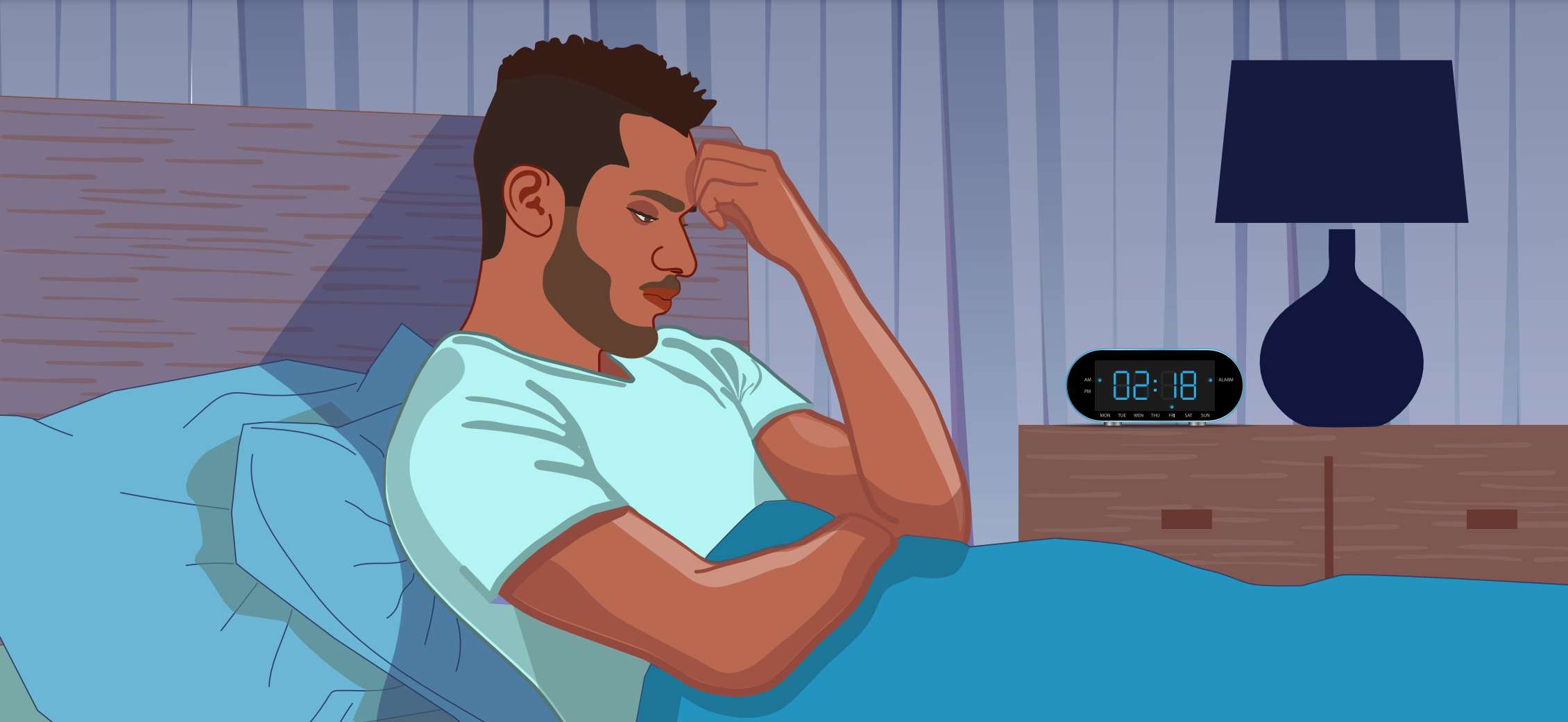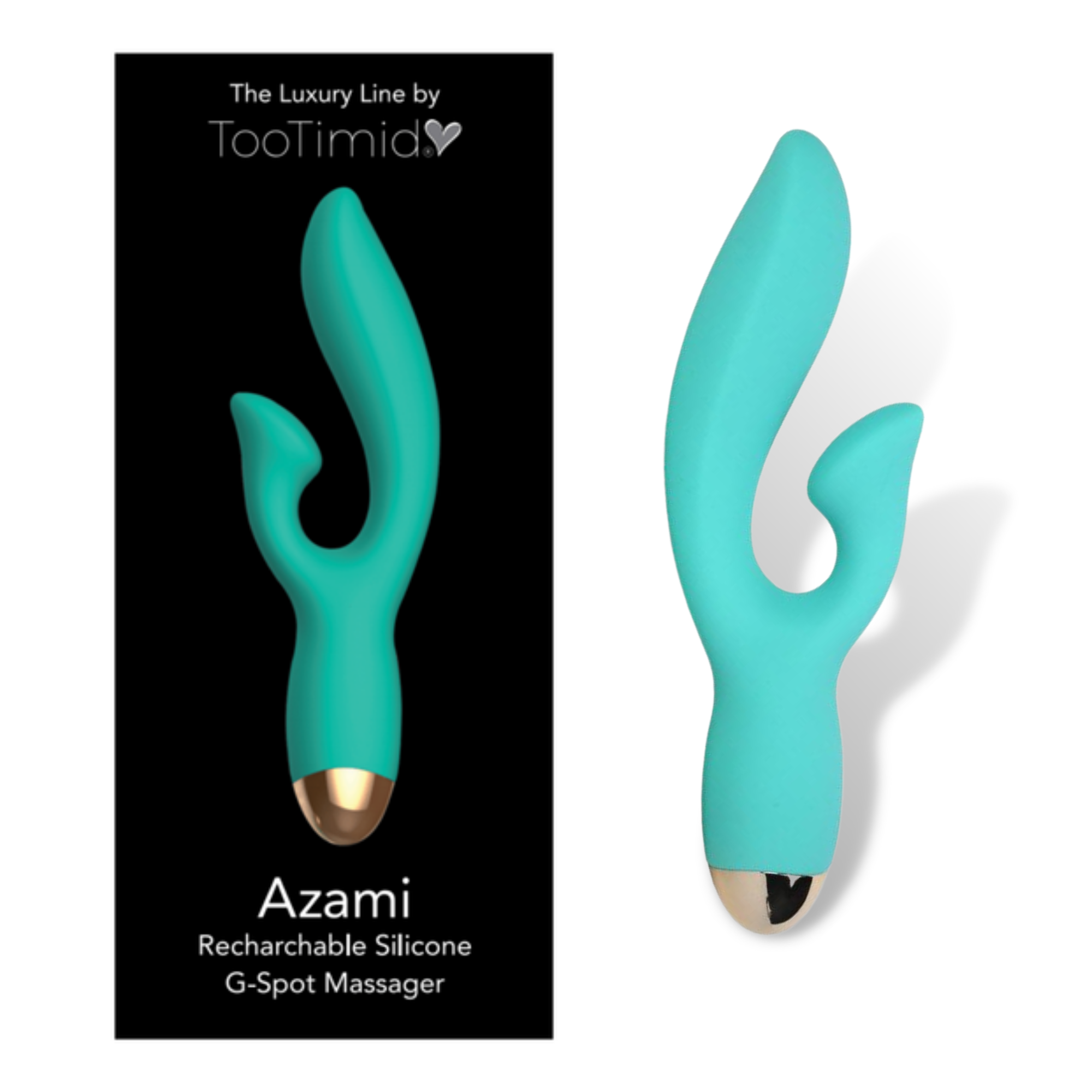Everything You Should Know About Erectile Dysfunction

Erectile dysfunction, or E.D. is an inability that millions of penis owners face every day. In fact, all penis owners will experience some form of erectile dysfunction at some point in their life.
There are three forms of E.D. that are important in understanding how E.D. manifests in different individuals or in a single individual over the course of a lifetime:
- Physical/Medical Reasons
- Mental Health Reasons
- Everyday/Temporary Reasons
Physical/Medical Reasons:
One form is caused by a clear medical reason such as diabetes, underlying cardio, and structural complications. By addressing the underlying medical causes of this form of erectile dysfunction, the erectile dysfunction may resolve or transition into the second form.
Mental Health Reasons:
Mental health disorders is the second form in which E.D. can take place. This form may be attributed to mood disorders, substance abuse, or a result of a diagnosable mental health condition of its own such as erectile dysfunction, premature ejaculation, and delayed ejaculation.
In cases of mental health related erectile dysfunction, performance anxiety is the most common underlying cause.
Everyday/Temporary Reasons:
The final form involves a temporary experience of E.D. caused by everyday reasons including high stress, alcohol, and aging. This form of E.D. would not be an indicator of any of the attributes involved in the first two forms which require underlying medical or mental health reasons. Unlike these previously mentioned forms, E.D. as a result of everyday reasons will most likely resolve on its own.
The most conservative estimate given by the National Ambulatory Medical Care Survey states; “for every 1,000 men in the United States, 7.7 physician office visits were made for E.D. in 1985. By 1999 that rate had nearly tripled to 22.3,” (National Kidney and Urological Disease Center, 2017).
The increase happened gradually, presumably as treatments such as vacuum devices and injectable drugs became more widely available and discussing erectile function became accepted.
Perhaps the most publicized advance was the introduction of the oral drug sildenafil citrate (Viagra) in March 1998. “NAMCS data on new drugs show an estimated 2.6 million mentions of Viagra at physician office visits in 1999, and one-third of those mentions occurred during visits for a diagnosis other than ED" (National Kidney and Urological Disease Center, 2017).
Many penis owners experience feelings of embarrassment or extreme shame when experiencing E.D. But, it is important to remember that E.D. is a normal phenomenon that penis owners can experience at any age.
If you or your partner are experiencing erectile dysfunction or generally unreliable erections there is hope. This article is a great starting point in understanding and educating yourself about what can feel like a very embarrassing situation.
There are many effective treatments available for erectile dysfunction and those experiencing E.D. have various solutions to consider when seeking treatment. Do not be afraid to speak to a doctor about your symptoms.
Identifying the form of E.D. you are experiencing with the help of a medical professional is crucial to properly addressing and solving the issue.
What Exactly is ED?
Erectile dysfunction or, E.D. is a term that describes all types of failure to get or keep an erection including, in some cases, psychological or severe medical reasons. E.D. can also occur from many different temporary causes such as stress, alcohol, or aging.
Despite being commonly perceived as a term associated with hopelessness, there are, in actuality, many effective treatment options available for those with the condition.
E.D. is formed from the root of various penile issues: the total inability to achieve an erection, an inconsistent ability to achieve an erection, or serious problems sustaining erections.
The cause can be physical - such as cancer or other diseases, injury, or most commonly, side effects from medications such as blood-thinning medications, antihistamines, antidepressants, tranquilizers, appetite suppressants, and cimetidine.
“The incidence does increase from 5% of 40-year-old men to between 15 - 25% of 65-year-old men.” (National Kidney and Urological Disease Center, 2017).

To understand the effects of E.D., let’s discuss the way the penis becomes erect. It is basically a blood flow issue. Time for Biology 101 (or maybe 401).
The penis contains two chambers called the corpora cavernosa, which run the length of the penis. A spongy tissue fills the chambers. The corpora cavernosa are surrounded by a membrane, called the tunica albuginea.
The spongy tissue contains smooth muscles, fibrous tissues, spaces, veins, and arteries. The urethra, which is the channel for urine and ejaculation, runs along the underside of the corpora cavernosa which is surrounded by the corpus spongiosum.
When a penis owner becomes stimulated or aroused, the brain sends impulses to the nerves in the penis, allowing the muscles of the corpora cavernosa to relax and blood to flow in filling the spaces.
The blood creates pressure in the corpora cavernosa, making the penis expand. This blood gets trapped by the tunica albuginea, thereby sustaining erection. Now, when these muscles fail to contract and stop the blood from flowing out of the penis, an erection becomes weaker or is gone altogether.
This process is extremely precise and there are a lot of areas that are sensitive to failure. If any single event is disrupted due to injury, psychological block, or medical condition, E.D. occurs.
For example, as aging occurs, nerve damage also can happen - this results in the most common reason for E.D. Diabetes, Kidney Disease, Heart Disease, alcoholism, low testosterone levels, M.S., smoking, being overweight, not exercising or a number of vascular disorders can happen to any age male and cause E.D.

Can It All Be In My Head?
The most significant non-medical cause of E.D. is psychological.
“It is estimated that between 10-20% of all cases are due to such factors” (National Kidney and Urological Disease Center, 2017).
The mind is a powerful tool - and while it helps to get you aroused (through visual stimulation, internal narratives and thought processes) it can also be the downfall of your erection.
A few factors that can limit your chance of acheiveing or keeping an erection include:
- Trauma
- Relationship Complications
- Performance or Anticipatory Anxiety
- Stress
- Depression
- Low Self-Esteem
- Fear of Sexual Failure
Understanding E.D.'s Physical Roots: Erectile dysfunction isn't only about bedroom blues. It's often linked to physical issues like diabetes, cardiovascular disease, and certain medications. These conditions can affect blood flow or cause nerve damage - both crucial for sexual health. Worried about your meds? Don't panic. Talk with your healthcare provider instead.
The issue with these psychological factors is that they create a dangerous circle of failure. Every penis owner at one time or another will have erectile difficulties. It is when those difficulties continue that there is a cause for worry.
When a penis owner has an occasional erectile issue, they may immediately panic.
Sexual performance anxiety, or intense anxiety before or during sexual activities pertaining to one’s level of performance, can lead people to think to themselves, "Oh my god, what happened? I was attracted to them, I was excited, what happened to my penis?"
This type of thought process can lead to or stem from anticipatory anxiety, a form of anxiety that causes an individual to have thoughts such as, “what if it happens again?” when thinking about having sex in the future.
This cycle can ruin chances to achieve or keep an erection the next time they want to have sex. They begin to avoid sex altogether to limit the humiliation they feel. Meanwhile, their partner gets frustrated.
If you are having erection issues during sexual activities with a partner you need to maintain open and honest communication with your partner. Tell them that this is happening so that they can be a support system for you. Psychological games that happen with E.D. is that oftentimes, a person is able to get an erection, keep an erection, and orgasm easily during masturbation.
This is because there is no pressure to perform with solo play. The person is free to do it how they want it - fast, slow - and climax. This adds to the psychological issues and often causes the person to wonder why they can not perform in bed. If your partner is experiencing psychological erectile issues, be patient, be understanding, and be kind.
Assist your partner in seeking professional assistance and find ways to transform the space between you into a comfortable environment where there is no pressure, shame, or judgment. There are other ways to stimulate each other aside from penetration in the meantime, which we will discuss later.
Furthermore, stress can be an important factor in E.D. Finding ways to destress in a situation that causes an extreme amount of stress can be tantamount! Consider yoga or relaxation techniques; exercise; evaluate your life stress levels from your job, family, and money.
Try to separate this life from your sex life. It can take a powerful mind to overcome the normal life stresses that we as humans experience every day.
Getting The Help You Need
- Step 1: Seek Professional Assistance
- Step 2: Testing
- Step 3: Visit a Urologist
- Step 4: Connecting with a Psychological Professional
Step 1: Seek Professional Assistance
If it becomes apparent that your erectile difficulties are not just an infrequent issue caused by momentary stress or just a fleeting moment - you need to seek professional assistance.
There are no doctors who have not heard this same scenario from at least a couple handful of patients - don’t be embarrassed! The last thing you want or need is to have a serious underlying medical condition, like diabetes or cardiovascular disease, that will go unnoticed or treated.
Step 2: Testing
Your doctor will take a personal history from you, check the normal vital signs, ask about the particulars of your E.D., and then order tests. More often than not, they will begin with blood tests that reveal early diabetic signs, testosterone levels, and blood count. If these tests come back normal - then there may be another step.
If these tests come back abnormal (i.e. high blood sugar) the doctor will suggest a treatment plan which can include possible lifestyle or dietary changes to address the underlying condition causing your E.D. If your E.D. still persists despite following the treatment plan, make sure to communicate this with your doctor so that they may find another solution, such as further testing with a urologist or other medical specialists.
Step 3: Visit a Urologist
More in-depth testing, or referral to a urologist, may be needed. An ultrasound or scan (MRI) of your penis can indicate any blood flow issues, nerve damage, or other obstructions that may not be readily felt. In some cases, nocturnal erections are monitored to see if these are still developing normally. All these tests help the doctor to find answers.
Step 4: Connect With a Psychological Professional
If the above tests do not reveal an underlying cause, the doctor may at this time refer you to a licensed mental health professional or sex therapist. This specialist can ask questions and come up with ideas as to what psychological issues are causing the E.D. Oftentimes, it is simply stress or a severe fear of failure that comes up and prevents erections. These doctors are great at determining underlying causes.
Solutions, Ideas & Getting Better
Of course, depending on the reasons for your E.D., help may require further measures. As aforementioned, one of the ways to help E.D. Patients with mild issues are through lifestyle changes;
- Losing Weight
- Exercising
- Quitting Smoking
- Stopping Drinking
- Altering Diet
All of these can help those patients who have a mild, physical reason for the E.D. The doctor will give specifics for helping to achieve a healthier lifestyle which may include changing medications that have E.D. as a side effect.
If there is a more serious medical issue, such as a blood flow issue, nerve damage, or other penile injuries, the solution may be as simple as using an erection enhancement product such as:
- Cialis ®
- Viagra ®
These medications make the blood flow stronger to overcome the leakage that happens with valve issues. Cialis ® and Viagra® however, are not typically recommended for those with E.D. that are stemmed from psychological difficulties.
They will not work to decrease strong emotions or anxiety that are the cause of E.D. in these situations. Make sure you consult your doctor before taking any medications for E.D. Your doctor will develop a personalized treatment plan for you, your body, and your situation.
Some doctors even suggest using a penis pump to help achieve a stronger erection. While the penis pump may work for that short session, pumps, in general, are not always successful for long-term treatments. If this is something you are interested in trying, we have a selection of penis pumps on TooTimid.com.
The most invasive and complicated treatment is when a doctor suggests surgical treatment. There are a range of procedures from repairing broken blood valves or blocking off valves that enable blood to flow out of the penis, to inserting penile implants that allow the penis owner to "pump" up their erection from inside.
These procedures are drastic and oftentimes do not offer long-term help. Undertaking this kind of procedure takes a lot of thought on the part of the penis owner.
A new treatment using shock wave therapy has recently been shown to stimulate blood flow and combat symptoms of E.D. The treatment involves using a small wand-like device with targeted sound waves to stimulate penile tissue, increase blood flow, and potentially help to grow new blood vessels.
This treatment is in testing stages and has not yet been approved by the Food and Drug Administration (FDA) for use in treating erectile dysfunction, (Health University of Utah, 2023).
Finally, if the reason for the E.D. is found to be psychological, the treatment is not quite so swift. On rare occasions, the doctor will supplement the psychotherapy with an E.D. prescription or procedure, to help the patient get their confidence back. But, most often doctors will suggest the patient focus on managing the emotions that are blocking their ability to achieve erection.
This may involve methods to reduce stress or dismantling insecurities or fears associated with sexual performance. Doctors may also suggest therapy targeted at underlying issues such as anxiety or depression. In addition to this, the doctor may suggest that the patient tell their partner what they are experiencing and may further suggest couples counseling. It is essential that the patient's partner understands and supports their treatment.
Help For All
No matter what the underlying cause of E.D. is, being optimistic about the situation and getting support can be the biggest benefit. Finding other ways to please your partner is one of the essential ways to overcome the fear of E.D.
Knowing that oral sex, manual stimulation, or mutual masturbation can be as fulfilling, or more so, than actual intercourse can greatly take the stress off the situation.
There are many books available on the subject that I will list at the end of this article. These can help get a couple more intimately connected. For example, having "touching nights" where there is no sex, just touching. Even if the penis owner gets aroused - no sex!
This completely takes the stress out of the situation and helps the penis owner see their natural reaction. Furthermore, if a couple finds themselves in an intimate moment and is trying to have sex but the E.D. rears its ugly head, the other partner has to be able to say "That's OK" and suggest their partner watches as they masturbate or use their partner's fingers or mouth to get them to climax.
This allows the penis owner to feel like they are performing and helps improve intimacy as a couple.
There are also great suggestions for regaining intimacy by using Tantric sex. In fact, Tantric Sex offers an "erection-free" way to make love that concentrates on being close together and feeling each other's energy source. Some swear that the most intense orgasms for both partners need not include an erection!
For those with E.D. as a result of performance anxiety or mental health issues, consider consulting with a sex therapist.
"Sex therapists can use sensate focus therapy, solo and/or with your partner, to work to reset your sex life, build trust, and prioritize pleasure. It helps to shift patterns of behavior that have not been helpful towards patterns that support improved intimacy," (Sexual Health & Healing LLC).
This method uses mindfulness, exposure therapy, and systematic desensitization to rework the way you have and think about sex. Sensate focus therapy has been very successful in treating a variety of conditions including E.D., pre-ejaculation and delayed ejaculation.
While these are just a few of the ideas and suggestions - there are many more to be found. Reading about the subject or talking to a professional can be the first way to help fix the issues. E.D. can be a bad experience at any point in life - but it does NOT have to be the end of your sex life! Learning why this happens, what you can do to regain control of it, and how your partner can support you and still be intimate with you are essential elements of regaining control.
So, if you or your partner are someone who is experiencing E.D., seek professional help, get the information you need, and make choices on treatment.
You do not have to suffer with an infrequent sex life - or no sex life at all - if you are willing to talk about the issues you are having. Take comfort in the fact that millions - yes millions - of people have this condition and that you are not alone.
References:
National Kidney and Urologic Diseases Information Clearinghouse Website
https://www.niddk.nih.gov/health-information/health-topics/urologic-disease/erectile-dysfunction/Pages/facts.aspx
https://healthcare.utah.edu/mens-health/conditions/erectile-dysfunction/shockwave-therapy
https://sexualhealthandhealing.org/what-is-sensate-focus-therapy/
Books you may find helpful:
- Coping With Erectile Dysfunction: How to Regain Confidence and Enjoy Great Sex by Michael E., Ph.D. Metz and Barry W., Ph.D. McCarthy
- An Atlas of Erectile Dysfunction by Roger S. Kirby
- Rekindling Desire: A Step-by-Step Program to Help Low-Sex and No-Sex Marriages by Barry W. McCarthy and Emily J. McCarthy
1 comment
![["<div", "class=\"metafield-rich_text_field\"><p><strong>Article", "Reviewed", "and"]](http://www.tootimid.com/cdn/shop/files/dr-image-001.png?crop=center&height=75&v=1712236737&width=75)










![["<div", "class=\"metafield-rich_text_field\"><p><strong>Article", "Reviewed", "and"]](http://www.tootimid.com/cdn/shop/files/dr-image-001.png?crop=center&height=50&v=1712236737&width=50)


Thanks for the info. One of the many reasons I shop your company.
Leave a comment